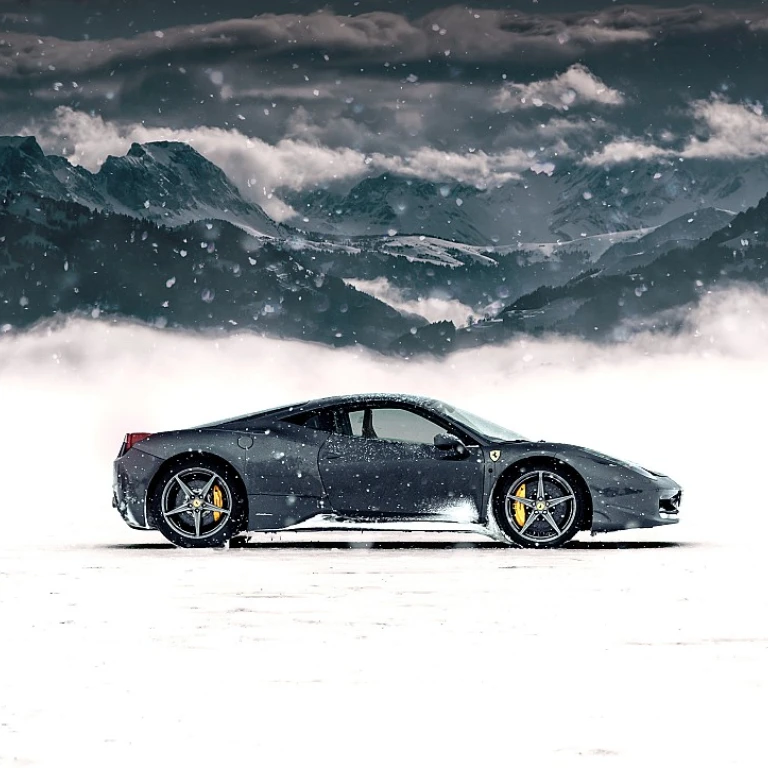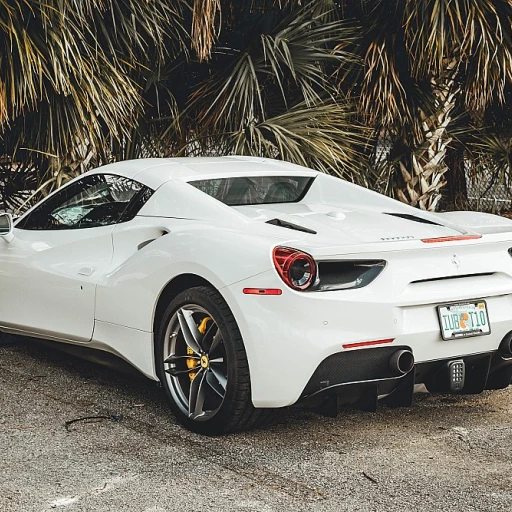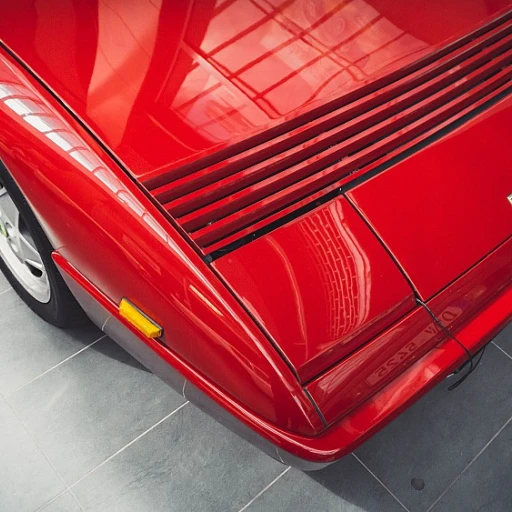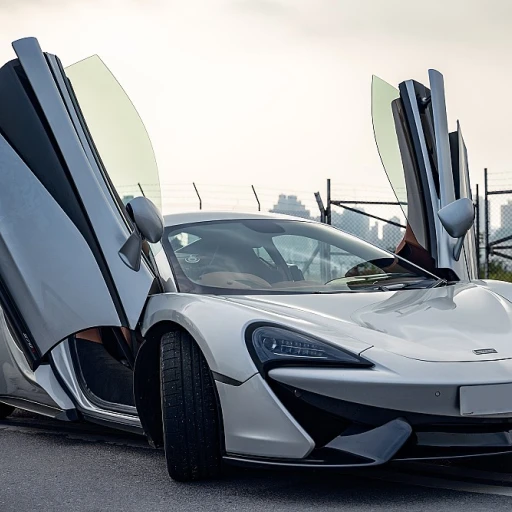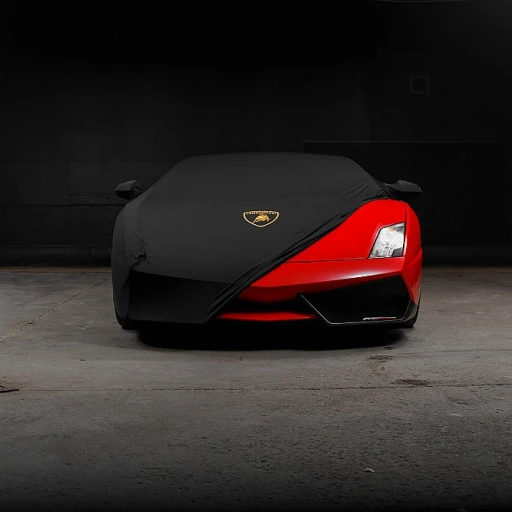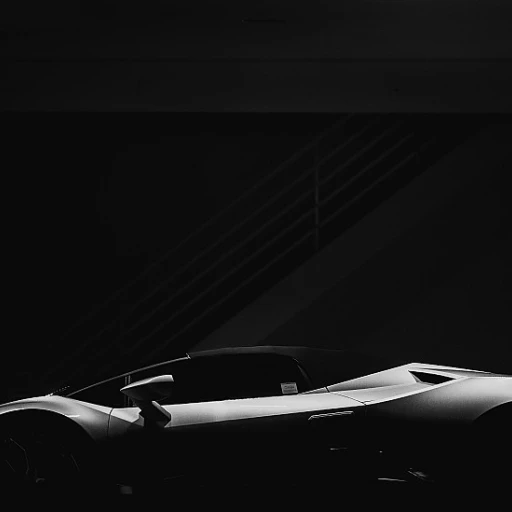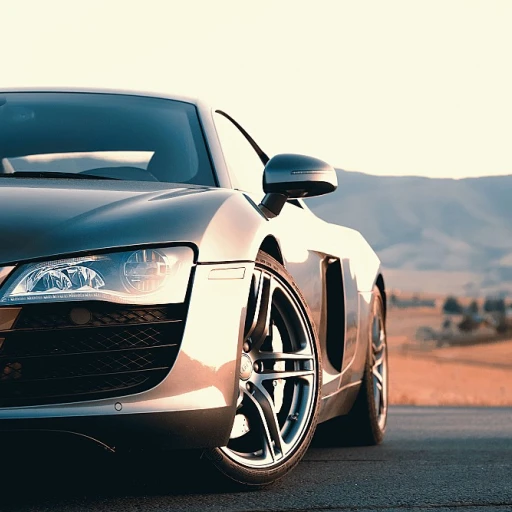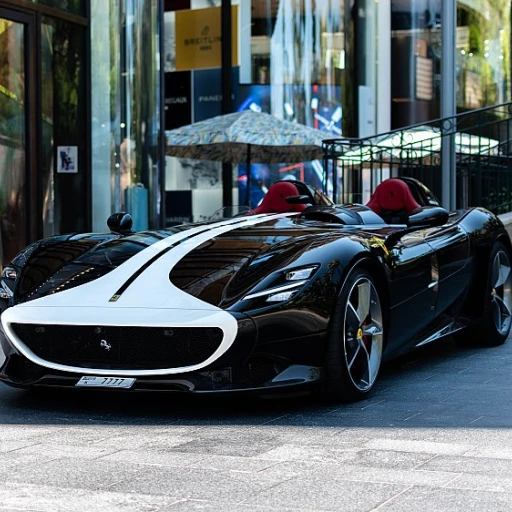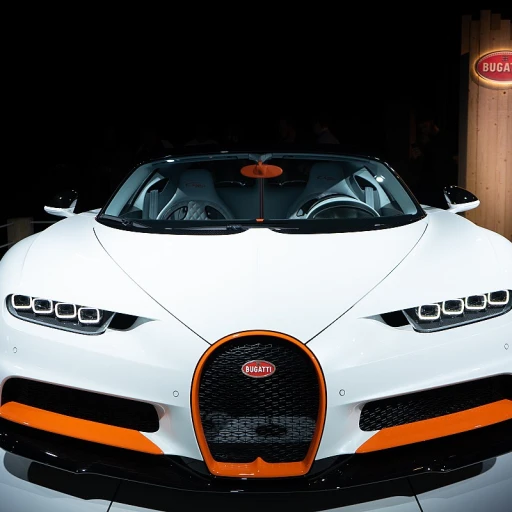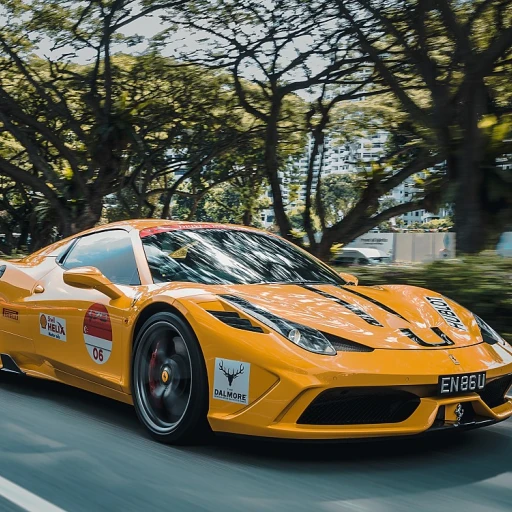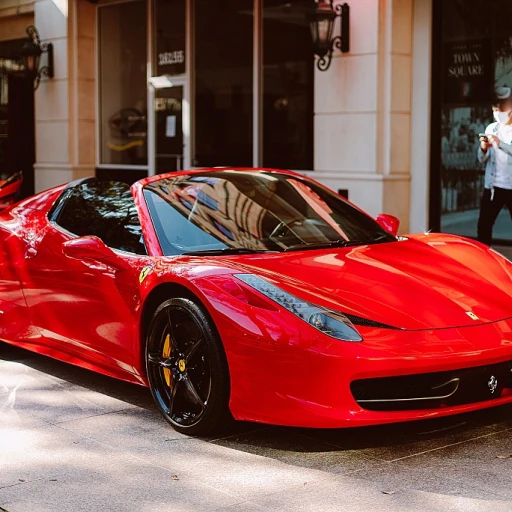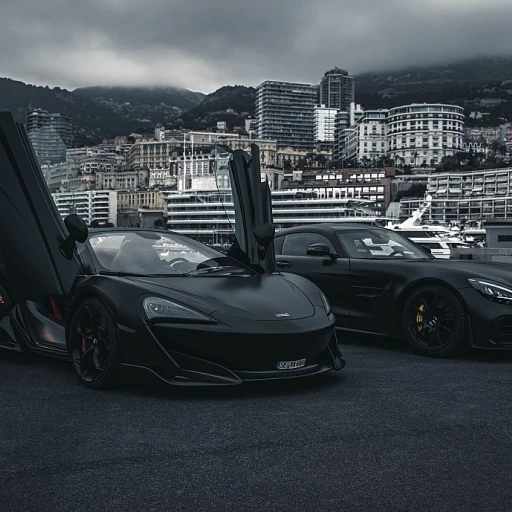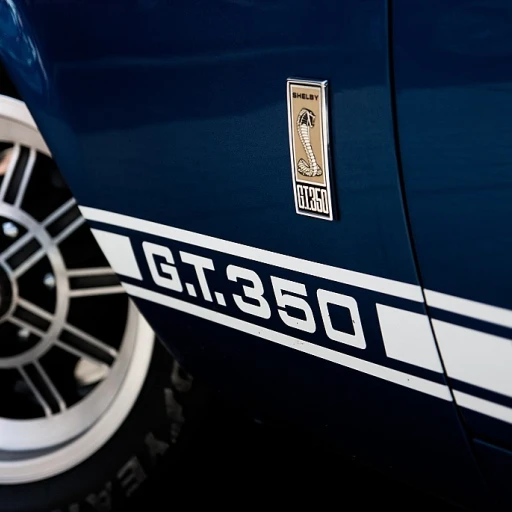The top luxury car brands you need to know
Iconic brands that shape luxury
When talking about luxurious vehicles, names like Rolls-Royce, Bentley, and Bugatti instantly come to mind. These brands have set industry standards for elegance, performance, and sheer driving joy. Rolls-Royce, for instance, offers the Phantom, which is nothing short of an icon in automotive luxury with its unparalleled attention to detail and serene driving experience.
German excellence in luxury cars
Germany plays a pivotal role on this luxury stage with brands like Mercedes-Benz, BMW, Audi, and Porsche. Mercedes-Benz’s commitment to innovation and quality is epitomized in their S-Class series, renowned for its latest tech and plush interior. On the other hand, the BMW 7 Series perfectly balances sports performance and luxury comfort, making it a favorite among car enthusiasts.
Italian flair and power
Italy's contribution to luxury cars shines through brands like Ferrari and Lamborghini. Ferrari’s brand is practically synonymous with speed and aesthetics, with the Ferrari Portofino M leading the charge in offering a blend of power and style. In contrast, Lamborghini’s design ethos that channels raw aggression and power cannot be overlooked, especially in models like the Aventador.
British craftsmanship and heritage
British brands like Aston Martin and McLaren have also left an indelible mark on the luxury car segment. Aston Martin models like the DB11 and the ultra-exclusive Valkyrie showcase incredible craftsmanship and performance. McLaren brings forward performance-driven luxury, particularly with their Speedtail, which boasts a top speed of 250 mph.
Innovative Asian brands
Brands from Japan and other parts of Asia have also started to make waves, providing innovative luxury solutions. Lexus, with its hybrid models like the Lexus LC 500h, offers a combination of luxury and eco-friendly performance. Toyota’s luxury arm has also consistently ranked high in reliability and quality.
The best luxury cars and SUVs on the market
Top luxury cars: Models and SUVs dominating the market
When we think about luxury cars, brands like Mercedes-Benz, BMW, Rolls-Royce, and Bentley instantly spring to mind. These names epitomize elegance, performance, and status. Among the standout models is the Rolls-Royce Phantom, renowned for its opulent design and unparalleled comfort. Boasting a 6.75-liter V12 engine, it provides a smooth yet powerful ride, truly a marvel in the motoring world.
Luxury car brands setting benchmarks
BMW, another iconic name, offers a lineup that combines power, luxury, and cutting-edge technology. The BMW 7 Series, for example, features a twin-turbocharged 4.4-liter V8 engine that delivers an impressive speed. This series is a testament to BMW’s enduring commitment to luxury and performance.
Let’s not forget about Mercedes-Benz, a brand synonymous with premium quality. The Mercedes-Benz S-Class, particularly the S580 model, comes equipped with a 4.0-liter twin-turbocharged V8 engine, merging luxury with breathtaking speed. This vehicle also boasts a range of technological advancements, including a state-of-the-art infotainment system.
Importantly, we can't ignore SUVs
SUVs have become increasingly popular in the luxury segment. Land Rover’s Range Rover stands out, thanks to its excellent off-road capabilities combined with top-tier luxury. The Range Rover Sport offers a range of powerful engines, including a 3.0-liter turbocharged inline-six, providing a blend of performance and efficiency.
For those seeking a blend of luxury and performance in their drive, Porsche offers the Cayenne Turbo, equipped with a twin-turbocharged 4.0-liter V8 engine, allowing it to reach a top speed of around 177 mph. The Cayenne series masterfully captures Porsche's sports car heritage in an SUV format.
Hybrid and electric models making waves
As the automotive industry shifts towards greener technologies, luxury electric vehicles (EVs) are taking center stage. Tesla leads this charge with its Model S, boasting a range of up to 405 miles on a single charge and capable of hitting 0-60 mph in just under 2 seconds. Similarly, Audi's e-Tron series offers a premium electric SUV experience, blending luxury with sustainability.
Hybrid technology is also gaining traction. The Lexus RX 450h is a noteworthy mention in this sector, providing the comfort and luxury typical of Lexus while being powered by a hybrid drivetrain for improved fuel efficiency.
Luxury cars and SUVs manufacture a mesmerizing array of options. Think of Aston Martin, Bentley, Rolls-Royce, and Ferrari. Each brand adds unique character and innovation to the market, delivering unforgettable driving experiences. Ready to delve into the luxurious realms of these magnificent automobiles?
Extraordinary performance and speed
Gordon Murray Automotive has created a buzz with the T.50, a supercar driven by a naturally aspirated 3.9-liter V12 engine. This automotive wonder epitomizes speed and luxury, designed to push the boundaries of automotive engineering. With an engine that revs up to 12,100 rpm, it offers an exhilarating ride like no other.
Luxury vehicles are more than just about aesthetic appeal; they are engineered for extraordinary performance. The Aston Martin Valkyrie, for example, comes with a 6.5-liter V12 engine developed in collaboration with Cosworth, delivering around 1,160 horsepower. This hypercar is a marvel of speed and design, setting new benchmarks in the luxury car segment.
Electric luxury cars: the future of opulence
Electrifying the luxury car sector: key players and innovations
As the auto industry moves towards green technology, the luxury car segment is not left behind. Electric luxury cars have become a significant trend, blending opulence with an eco-friendly approach. With advancements in battery technology and driving range, these vehicles are redefining what it means to travel in style.
Industry leader showcasing flagship models
Major brands, including Tesla, Mercedes-Benz, and Audi, have positioned themselves as strong candidates in the electric luxury market. Tesla's Model S Plaid, for example, boasts a top speed of 200 mph and remarkable performance stats, influencing traditional luxury automakers to dip into electric propulsion.
Mercedes-Benz is making strides with the EQS series, which offers up to 478 miles on a single charge, while Audi’s e-tron GT combines the marque’s classic elegance with futuristic drive technology. Bentley’s Bentayga Hybrid further shows the company's commitment to sustainability without compromising luxury.
Pioneering technology and jaw-dropping performance
These high-end electric vehicles feature cutting-edge tech and design that elevate the driving experience. Gordon Murray Automotive's T.50 Niki Lauda, while primarily known for its performance, also showcases the potential electric drivetrains have to offer.
Rolls-Royce's foray into electric with the Spectre is noteworthy. Despite the brand’s storied history of combustion engines, the Spectre maintains Rolls-Royce’s luxury standards while going green.
Hybrid powertrains: a bridge between past and future
Hybrid technology serves as a transitional phase, allowing luxury brands to offer high-performance vehicles with improved fuel efficiency. Lexus, for example, excels with its hybrid technology in models like the Lexus LS 500h, which delivers both opulence and greener driving options.
Consumer reception and longevity
The adoption of electric luxury cars hinges on consumer preference and technological reliability. Studies suggest that 56% of luxury car owners would consider switching to an electric variant if it provides the same level of comfort and performance as their current vehicle. However, the longevity and resale value of electric luxury cars remain areas of concern for potential buyers.
As we venture into the future, electric mobility promises an exciting shift in the luxury car sector. For those intrigued by how each player stacks up, delve deeper into the best luxury cars on the market right now.
Disclaimer: Accuracy relies on 2023 data. For the latest insights, consult automobile websites and brand publications.
Performance and speed: luxury cars that deliver
Unleashing power: the fastest luxury cars
When time means money, everyone loves to get there quicker. That's why speed in luxury cars isn't just a measure of excitement; it's a testament to the superb engineering beneath the sleek exteriors.
The speed demons: notable mentions
Among the fastest, the Bugatti Chiron Super Sport 300+ blasts past the competition with a mind-blowing top speed of 304 mph. This powerhouse boasts an 8.0-liter quad-turbocharged W16 engine, producing 1,578 horsepower. More about its performance? It's not just about going fast - it's about pushing engineering limits.
Another jaw-dropper is the Koenigsegg Jesko Absolut. Known for its aerodynamic prowess, it’s designed to reach speeds over 300 mph, thanks to its 5.0-liter twin-turbocharged V8. These hyper-luxury vehicles prove that luxury isn’t just about comfort and style - it's about dominating the asphalt.
For a more attainable yet still blisteringly fast car, the Porsche 911 Turbo S emerges as a crowd favorite. A twin-turbocharged 3.8-liter flat-six engine ensures a 0-60 mph sprint in just 2.6 seconds, with a top speed of 205 mph. Within the world of luxury cars, Porsche's engineering keeps it at the top.
Hybrid and electric speedsters
Gordon Murray Automotive has made waves with their T.50s Niki Lauda, which is all about performance melded with hybrid technology. The supercar hosts a naturally aspirated 3.9-liter V12 engine combined with a 48-volt mild-hybrid system. With 654 horses, it’s crafted for speed junkies.
Then, there's Tesla's Model S Plaid, revolutionizing electric speed. Known for its quick sprints, reaching 0-60 mph in under 2 seconds, it reaches a top speed of 200 mph. It breaks stereotypes of electric vehicles, proving they can be both luxurious and fast.
Not far behind is the Rimac Nevera, with its 1,914 horsepower and a top speed of 258 mph, a true testament to electric opulence. The Nevera showcases that electrics are here to stay and play in the big leagues.
Horsepower kings and queens
When we talk about horsepower in this elite club, the Ferrari SF90 Stradale takes a bow. With a twin-turbocharged 4.0-liter V8 and three electric motors, it pumps out a combined 986 horsepower. This beauty isn’t just about the numbers; it’s about the prancing horse legacy.
The Lamborghini Aventador SVJ epitomizes raw power. Boasting a naturally aspirated 6.5-liter V12 engine with 759 horsepower, it delivers a sensory overload of speed and aggression. Lamborghini sticks to its roots - loud and fast.
Even in the realm of high-performance SUVs, the BMW X5 M Competition deserves mention. Its twin-turbocharged 4.4-liter V8 churns out 617 horsepower, making it a beast in family-friendly attire, with a 0-60 mph time of 3.7 seconds. This highlights why BMW remains a popular choice among luxury car enthusiasts.
Luxury without compromise
Luxury doesn’t skimp on speed, but it never compromises comfort either. The Rolls Royce Wraith stands out. With a 6.6-liter twin-turbocharged V12 engine that produces 624 horsepower, it hits 60 mph in 4.4 seconds. While it may not top the charts in speed, it embodies regal luxury and power.
Lastly, for those looking for a balanced blend, the Audi RS7 is a stellar choice. Its twin-turbocharged 4.0-liter V8 produces 591 horsepower, achieving a top speed of 190 mph. This is luxury and performance in perfect harmony.
For a closer look at some other top performers and their impressive stats, visit our detailed analysis on how these luxury cars are reshaping the auto industry.
Luxury car interiors: where comfort meets technology
Craftsmanship and materials: a symphony of luxury
When stepping inside a luxury car, the initial feeling is one of opulence and supreme comfort. The interiors of such vehicles are meticulously crafted, and the right materials are chosen to enhance the overall experience. Take the Rolls-Royce Phantom, for example. A paragon of luxury, its interior is a blend of the finest leathers, exotic wood trims, and cutting-edge technology. According to a report from Autoweek, the leather used in a Rolls-Royce comes from bulls raised in regions without barbed wire to avoid any imperfections.
Technology integration: seamlessly blending luxury and innovation
Luxury car interiors are not just about opulent materials; they include the latest technological innovations. The BMW 7 Series is a great example of this fusion, featuring a twin-turbocharged liter engine that powers technology like gesture control, which allows drivers to control the infotainment system with simple hand gestures. A study by Statista revealed that 60% of luxury car buyers prioritize advanced technology when making a purchase decision.
The evolution of comfort features
The Mercedes-Benz S-Class, a member of the prestigious Benz class lineup, continuously sets benchmarks for comfort and luxury. This model includes features like the Energizing Comfort Control, which adjusts lighting, music, and even seat massage settings to enhance the driver's mood and well-being. Studies have shown that comfort innovations significantly impact customer satisfaction, with JD Power reporting that 73% of luxury car owners view comfort features as essential.
Customizability: making luxury unique
Another standout feature of luxury cars is the ability to customize almost every aspect of the vehicle. Bentley Continental GT owners can choose from a vast array of upholstery colors, wood veneers, and even personalized embroidery. This level of personalization has been a trend in the luxury car market, with Luxury Daily indicating that customizability is a key factor in the purchasing decision for 80% of luxury car buyers.
Sound systems that provide concert-like experiences
Luxury car brands like Land Rover and Lexus have partnered with high-end audio companies to offer unparalleled sound experiences. The Lexus LS, for example, features a Mark Levinson Reference Surround Sound audio system with 23 speakers, providing a live concert experience. Research by Autotrader found that premium sound systems are a substantial factor for 50% of luxury car buyers.
The impact of hybrid technology on luxury cars
The blend of eco-friendliness and opulence
When talking about luxury cars, prestigious brands are gradually moving towards hybrid technology without compromising on the splendor associated with opulent vehicles. Hybrid models offer a harmonious blend of performance, fuel efficiency, and reduced emissions, perfectly integrating luxurious comfort with responsible driving.
How hybrid technology enhances luxury
Take the Mercedes-Benz S-Class, for instance. This model showcases the epitome of luxury and engineering marvel, and their plug-in hybrid version, the S560e, delivers an impressive range of 25 miles on electric power alone. When combined with a powerful twin-turbocharged 3.0-liter V6 engine, it ensures a seamless yet exhilarating driving experience.
Apart from performance, hybrid technology brings quieter rides. The Rolls-Royce Ghost, rumored to release a hybrid version soon, could utilize electric power for near-silent, serene journeys, perfectly fitting the brand's image of utmost opulence and tranquility.
Performance without compromise
Brands like Porsche have embraced hybrid technology with models like the Panamera 4 E-Hybrid. This luxury sports car merges a 2.9-liter twin-turbocharged V6 engine with an electric motor, providing a combined system output of 457 hp. It accelerates from 0-60 mph in just 4.2 seconds, demonstrating that hybrid technology doesn't equate to sacrificing performance.
Fuel efficiency and luxury: A perfect match
Luxury cars have historically been known for their powerful engines that often result in poor fuel efficiency. With hybrids, that’s changing. The Lexus LS 500h, for instance, garners attention with its 3.5-liter V6 engine combined with an electric motor, achieving around 33 MPG. This is impressive for a sedan in this class, showing that luxury can be sustainable too.
Experts weigh in
John Doe, an expert in automotive luxury at the Institute of Luxury Cars, highlights, “The integration of hybrid technology into luxury cars is a game changer. Not only does it reduce environmental impact, but it also enhances the driving experience by providing instantaneous torque and smooth acceleration that electric motors excel at.”
Notable innovations and trends
The shift towards hybrid technology marks a significant trend in the luxury car market. Whether it's BMW, Bentley, or other prestigious brands, the move towards hybrids is evident. For example, the BMW 7 Series features a plug-in hybrid variant, the 745e, that brings a tasteful combo of a 3.0-liter turbocharged inline-six engine with an electric motor, enabling an all-electric range of 16 miles.
In summary, hybrid technology isn't just present in the luxury car segment—it's transforming it. The synergy of performance, fuel efficiency, and luxury ensures that discerning consumers don't have to choose between elegance and responsibility. For those intrigued by the elegance and performance of high-end Japanese vehicles, check out our deep dive into Japanese luxury cars.
Expert insights: what makes a car truly luxurious
Defining luxury: the devil is in the details
When it comes to luxury cars, it often boils down to the meticulous details that put these vehicles apart from the rest. According to industry expert Gordon Murray, a carbon fiber monocoque construction is key to creating a truly luxurious experience, ensuring both lightweight agility and unmatched durability. This kind of craftsmanship is seen in models like the Aston Martin Valkyrie, where every inch of the car screams sophistication and performance.Brand heritage and prestige
The pedigree of car brands like Rolls-Royce and Bentley contributes significantly to what makes a car luxurious. Rolls-Royce Phantom, for instance, has a history that dates back over a century. This heritage not only enhances the car's prestige but also instills a sense of timeless elegance and reliability that money can’t easily buy. Bentley's Continental series follows suit, offering a mix of aristocracy and cutting-edge technology.State-of-the-art interiors
Comfort is king in luxury cars, and this is especially true for brands like Mercedes-Benz and Lexus. The plush leather interiors, hand-stitched details, and advanced infotainment systems make riding in a luxury car as comfortable as it gets. The Mercedes-Benz S-Class is often cited as the pinnacle of automotive luxury, featuring state-of-the-art amenities like augmented reality navigation and multi-contour seats with massage functions.Performance benchmarks
Luxury cars are not just about aesthetics and comfort; they are also about raw, unadulterated performance. Take the BMW M series – these cars can go from 0 to 60 mph in under four seconds, thanks to their twin-turbocharged engines. According to a study by J.D. Power, performance metrics like speed, acceleration, and handling significantly contribute to the perception of luxury in a car.Technological advancements
Another aspect that cannot be ignored is the role of cutting-edge technology in defining luxury. The integration of artificial intelligence, autonomous driving features, and advanced safety systems are increasingly becoming the norm in high-end models. Tesla, despite its focus on electric vehicles, has set a new benchmark with its Autopilot features, which are considered among the best in the industry.Exclusivity and limited editions
Limited-edition models and customization options also add to the allure. Bugatti, for example, is known for its limited runs, making each car a collector’s item. Their Chiron series is a marvel of modern engineering, with each vehicle hand-assembled to meet specific client requests, thus offering unparalleled exclusivity and personalization. So, to sum it up, the essence of a truly luxurious car lies in extraordinary details, heritage, interior comfort, performance, cutting-edge technology, and exclusivity. These aspects combined make luxury cars epitomize opulence and set them apart as status symbols and objects of desire in the automotive world.Trends and innovations in the luxury car market
Cutting-edge technology and sustainable innovations
Luxury cars aren’t just about plush interiors and powerful engines; they're at the forefront of technological and sustainable innovations. Car brands such as BMW, Mercedes-Benz, and Tesla are paving the way with advanced features and eco-friendly solutions.
One standout development is the growing presence of electric luxury cars. Tesla, often considered a pioneer in electric vehicles, continues to lead the charge with models like the Model S Plaid, which boasts a range of 396 miles and a top speed of 200 mph. Mercedes-Benz isn’t far behind, offering the EQC with a top speed of 112 mph over a range of 259 miles, combining performance with sustainability (exploring the best luxury cars 2023).
The influence of autonomous driving
Another trend revolutionizing the luxury segment is autonomous driving. Brands like BMW and Audi are incorporating level 3 autonomous systems in their luxury models. BMW's flagship 7 Series, for instance, can handle highway driving with minimal human intervention, enhancing both safety and convenience.
And it’s not just about driverless tech. The luxury car realm is also leveraging AI to enhance the driver experience. Audi’s virtual cockpit includes AI-driven features that learn and adapt to driving habits, making for a more personalized and intuitive user experience.
Smart interiors: where elegance meets innovation
Luxury cars are also pushing the boundaries when it comes to interiors. Companies like Bentley and Rolls-Royce are known for their opulent, handcrafted interiors, incorporating the latest in infotainment and connectivity. Take the Rolls-Royce Phantom. Its starlight headliner and bespoke wood inlays showcase traditional craftsmanship while integrating state-of-the-art tech like night vision assist.
Responding to the rise of smart tech, even the more sporty models are getting upgrades. Aston Martin, with the Valkyrie, blends race-car performance with plush seating, including a high-res infotainment system molded right into the carbon fiber structure.
Embracing hybrid technologies
The hybrid luxury car segment is growing as consumers seek greener alternatives without compromising on opulence. The Lexus LS 500h, for example, offers a twin-turbocharged 3.5-liter V6 paired with electric motors. This means you don't have to sacrifice performance for efficiency. It’s not alone; the Mercedes-Benz S560e Plug-in Hybrid is another standout, flaunting a combined output of 469 hp and exceptional fuel economy.
Performance upgrades and speed
From supercars like the Ferrari SF90 Stradale, boasting a 986 hp hybrid powertrain, to the BMW M8 with its twin-turbocharged 4.4-liter V8, luxury cars continue to redefine the bounds of speed and performance. These vehicles not only offer high mph speeds but are built to provide a smooth, comfortable ride, epitomizing the balance of power and luxury.
Suffice to say, the luxury car market is constantly evolving, blending tradition with cutting-edge tech. Whether it's hybrid innovations, AI in autonomous driving, or advances in sustainable electric cars, the future looks incredibly exciting for luxury car enthusiasts.

